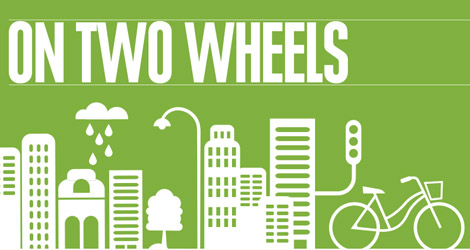On Two Wheels: Drink and Cycling
It’s summer, and a whole galaxy of Krakow pubs beckons. Since most of them are located downtown, it’s obvious for many of us to think of riding a bicycle down to sit in the Rynek or Kazimierz for a sip of beer or wiśniówka. But beware, there’s a catch – cycling home may bring a nasty surprise. In Poland, you can find yourself in prison if the police catch you cycling with a blood alcohol concentration above a mere 0.5 mg/ml.
However bizarre it may sound, the law is strictly enforced. In 2012, Dutch journalist Mr Bert van der Linden visited Krakow to cover the Euro 2012 championships. As a Dutchman, he naturally got himself a bike and pedalled into town. After a few beers, he set off to cycle back to his hotel. He didn’t make it. Instead, he was handcuffed by police, stripped almost naked and spent a night in jail after failing a breathalyser test. The affair became well known in Poland and stirred understandable uproar in the Netherlands, where nobody cares about cycling after a beer or three.
Mr van der Linden was far from the only cyclist to be stopped by the police. Breathalyser test for cyclists are routine in Poland. If you ride a bike in the evening, you can be sure you will be stopped sooner or later – the police seem to have a penchant for cyclists. Last year, roughly 170 thousand people were stopped for drink driving in Poland. Incredibly, half of them were cyclists. A recent catch was the editor-in-chief of Radio Dla Ciebie and local council leader of Warsaw’s Białołęka district.
Take a deep breath
You may wonder at the number of road traffic accidents caused by drunk cyclists. The answer is, not many and definitely not half of all road traffic accidents. In 2012, there were a total of 2,336 road traffic accidents in Poland caused by individuals over the alcohol limit, with 306 fatalities and 3,125 injuries. Of these, only 206 accidents were caused by cyclists over the alcohol limit (23 fatalities and 195 injuries) – well below 8 percent of the total, and with almost all victims being the cyclists themselves.
Legal technicalities, penal statistics
The blood alcohol concentration limit for drivers (and cyclists) in Poland is 0.2 mg/ml. A level between 0.2 and 0.5 mg/ml constitutes an offence (wykroczenie), punishable with a fine of up to 5,000 złoty. A blood alcohol concentration of 0.5 or above is a crime (przestępstwo) and can land you in prison for a year whether you are caught riding a bicycle or driving a 40-tonne truck. The only exception – which will take a good lawyer to prove – may be cycling off public roads, although you are unlikely to be able to tell if a road is public or not at a glance.
Wither you have committed an offence or a crime, you will be sent to trial. In practice, judges rarely send cyclists straight to prison. In most cases, they are fined heavily (several thousand złoty) or granted probation. The nasty catch is that, under Polish law, a judge must ban a convicted cyclist from riding for at least half a year. Breaching this ban is often harshly punished. If you hap- pen to be caught breaking a cycling ban – even if you are perfectly sober – you will face up to three years in prison. In 2012, more than two thousand people in Poland were sentenced to prison time for breaching a court ban on cycling, and there were as many as five thousand inmates serving prison term for the same crime – significantly more than the number serving time for drink driving.
With A major Criminal Code overhaul pending in the Polish Parliament, the law will likely be overturned in 2014. There seems to be broad political con- sent that cycling drunk should no longer be considered a crime, although it remains unclear how it will be punished. Until then, consider a small folding bike that will fit in a cab for the journey home, or think about exploring some other country on two wheels if you want to do it not fully sober.


Pingback: Drunk cyclists in Poland released by jail amnesty | Inside-Poland.com
Pingback: News and Upcoming Events of the Week: #22 | I Love Biking SF